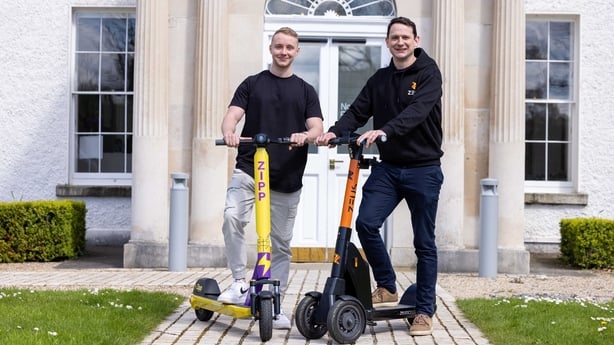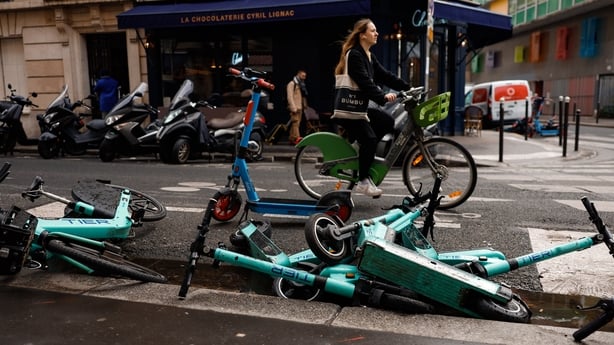[ad_1]
The ban on rental electric scooters in Paris is not seen as a setback by operators vying to enter the market in Ireland next year.
Paris was the first European city to embrace the concept of shared electric scooters in 2018, and the French capital became the first to bid them adieu last week, following a referendum in April.
The concept began with great promise, allowing users to rent e-scooters using mobile apps and leave them anywhere after use.
While the new form of urban mobility proved popular among a younger demographic in Paris, it ran into a number of challenges.
The referendum was called in response to a rising number of people being injured and killed on e-scooters, and despite a small turnout, the vote was decisive.
Three companies, Lime, Dott and Tier, all had contracts with the city to provide e-scooters with a total fleet of 15,000 e-scooters.
Once buzzing around the streets of Paris, the fleet has now been removed.
As Paris says au revoir, will Ireland say fáilte to e-scooters?
Ireland has been slow to hop on board e-scooters compared to other countries in Europe.
Over the summer, new legislation on the use of e-scooters was signed into law, paving the way for e-scooter rental schemes to operate here.
The Department of Transport published draft regulations which have been submitted to the European Commission and member states have 90 days to raise any issue.
Minister Eamon Ryan is expected to sign the regulations into effect by the end of October, provided no issues are raised.
In the meantime, the National Transport Authority and the Department are working on guidelines for councils on how rental schemes could be introduced.
Private e-scooter companies have already entered into talks with city and county councils.
Bolt, an Estonian mobility company, has deployed electric bikes in Kilkenny and Sligo.
It says if you want people to move from private cars to shared mobility, the best time to launch is spring or early summer.
“We wouldn’t want to launch something in autumn or winter so our hope is that we would be in a position to be in agreement with councils to be launching in the spring or early summer of next year,” said Aisling Dunne, head of policy for Bolt in Ireland.
Irish e-scooter start-up Zeus began operations in Germany and then spread to Sweden, Norway, Croatia, Italy, Malaysia, and the UK.
CEO Damian Young said the firm has been in touch “with most councils around Ireland” and the local authorities are waiting for the legislation to be complete before they look at the requirements within their jurisdictions.
“We’re not just looking at Dublin we want to bring the service to as many towns and cities in Ireland as possible,” Mr Young said.

The ban in Paris is not a cause for concern at Zeus. “It was a popularity contest in my view,” Mr Young said.
“My feeling is that they rushed into it, instead of regulating and properly managing shared schemes, they went for the popularity vote on whether they wanted shared schemes in the city of not.”
He cited a ban on bicycles in Amsterdam in the 1800s over safety concerns. “Here we are a few hundred years later and Amsterdam has the biggest cycling population per capita in the world.”
Ms Dunne from Bolt said the ban of e-scooter rental schemes in the French capital is “an unfortunate development”.
“I don’t think it’s indicative of a widespread view in Paris, because Paris is a great beacon as to how to change infrastructure towards active travel.”
She said it has given local authorities here pause for thought. “I don’t think councils are being guided by it, but I do think like any new initiative, there are concerns and things that need to be worked through, things like parking.”

Discarded scooters cluttered the streets of Paris and were considered a hazard, but Bolt says it has come up with a solution to the laissez faire approach to parking with virtual parking bays.
“We’ve already proven that they can work with our e-bikes,” Ms Dunne said.
She said technology is improving and evolving all of the time, and the company has introduced patent-pending technology to detect tandem riding and cognitive reaction testing which prevent users from unlocking e-scooters if their reaction time is too slow, indicating that they may have consumed an intoxicant.
Similarly, Mr Young said e-scooters at Zeus have a three-wheel design with two front wheels, which are “ultimately safer, and more stable”, especially for novice riders.
He said when shared e-scooters are introduced in Ireland, there will likely be more anti-social behaviour in the early stages; “We saw that with Dublin Bikes”.
“I think with the proper enforcement and with the gardai and other enforcement authorities on board, I think we will see that sort of anti-social behaviour reduce. It will become part of the norm of transport systems in any city.”
[ad_2]
Source link
